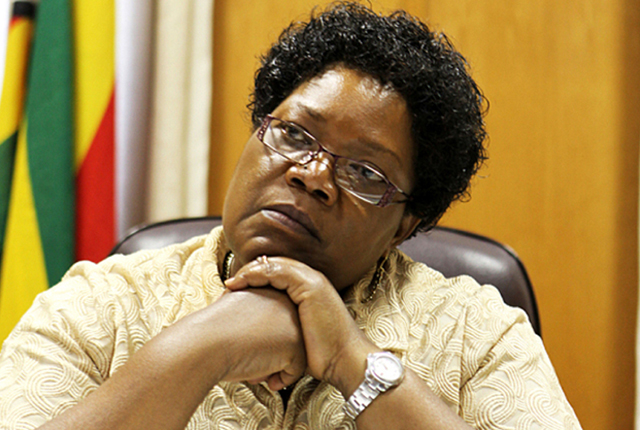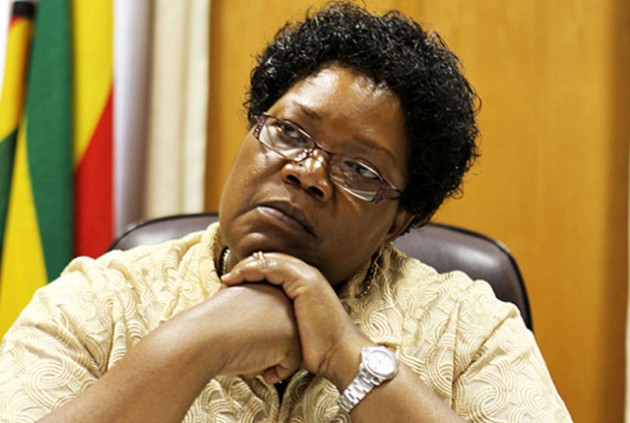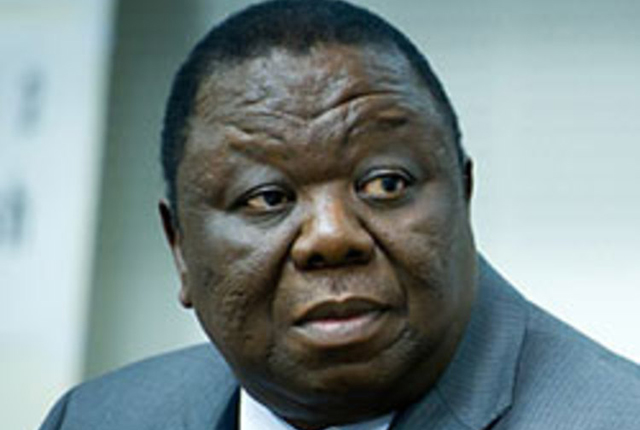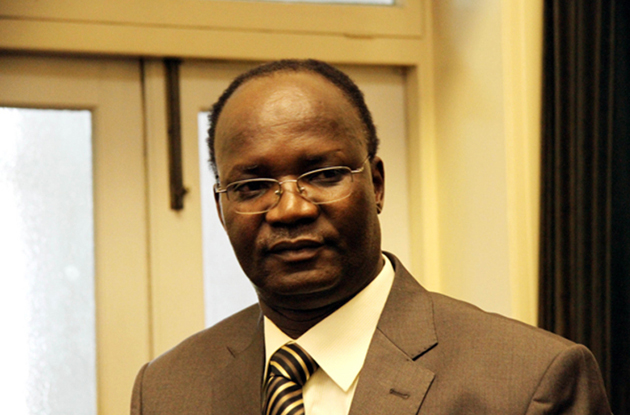Media: End of Meaning

The other side with Nathaniel Manheru
I had a chuckle the other day when Zimbabwe People First propaganda novices were at pains to suggest an epic battle for leadership between Joice Mujuru and Margaret Dongo.
The script was quite facile: so disenchanted was Dongo with Mujuru’s performance in her latest UK jaunt that she decided Joice was not good for ZimPF. In fact, the bald script continued, the feeling of Joice’s unfitness for leadership is so widespread that even Mutasa and Gumbo – all along given us as Elders – have had to join in ABJ, Anyone But Joice campaign. Which implies Dongo is better than Joice, indeed free of the historical encrustations which are thought to encumber and compound Joice’s unfitness to lead! Is that not interesting?

Joice Mujuru
Same material
The one dominant feature of ZimPF and its top leadership is its deep, common origins not just in ZANU-PF, but in the Government of Zimbabwe since its inception in 1980. That includes Margaret Dongo herself, however much she seeks to re-invent herself. After all, the man down whose bald head-slop she threatened to skid a few years back in Parliament, today stands as her political elder!
Does that not suggest in comic proportions the falsity of self-reinvention? What I can’t grasp though is how Joice Mujuru is allegedly rendered unfit to lead by exactly the same set of charges which seem to apply squarely to everyone within the ZimPF leadership echelon. Which then would suggest a self-argued wind-down of the movement, which hasn’t even become a party? Or its takeover by the “beautyful” ones who are yet to be born?
Mugabe, the glue that holds the opposition
What I seem unable to get, too, is how the so-called leadership in ZimPF could take so long to agree with me in respect of Joice’s lack of leadership qualities. Which would seem to suggest that their sense of judgment is woefully suspect, in which case they join her league on the leadership question. Or is this all a mind game? An attempt to create an illusion of stiff competition in order to sell ZimPF as an-equal-opportunities party?
To sell Joice as born out of the foundry of untrammeled democratic political competition? If so, the attempt has fallen flat on its face, and hoodwinks nobody at all. But it does underline one key weakness I have always pointed out in opposition politics, namely that the glue that keeps all opposition politics in Zimbabwe, paradoxically enough, is Mugabe.
Without him, more accurately without the feigned hatred of his person – in reality a deep backhanded admiration of him and his awesome leadership skills – there would be no opposition to talk about. Much as it has always made donor sense to pretend hatred of Robert Mugabe, it has never made political sense locally, which is how the opposition endgame is boringly the same – not even similar – but the same.
Gumpert’s semiotic fantasy
In 2012 Matthew Gumpert wrote a book on the end of meaning. I forget its title, which the reader can easily google. Its basic thesis was that “the spectre of the apocalypse has always been a semiotic fantasy”, a thesis which maintained that after all it is in the end of all things that their true meaning is finally revealed.
To wish for an apocalypse is thus to yearn for elusive meaning. Seen differently, man’s endless romance with catastrophe could register his wish to end an impossible task, including that involving the challenges of living in a world that seems increasingly incomprehensible to him. Meaningless, in other human words. Need you wonder, gentle reader, to come across some church called “Endtimes”, named after an imaginary and ineluctable apocalypse only beheld by its duplicitous founders?
Facing a personal crisis, or seeking to feed fat on the human fear of an apocalyptic end, a clever pastor proclaims divine Armageddon, thereby mobilising a staggering prayerful, paying membership whose panicky tithes win him a handsome livelihood. The whole matter goes beyond a semiotic fantasy; it becomes a horn of plenty that drips lucre for the pastor’s everlasting comfort.
And when finally a wizened flock succumbs from years of endless holy exploitation, the task is ended and with it, true meaning is revealed! After all, in the long run we are all dead, each meeting his little apocalypse, separately.
The polygamous monster
I don’t mean to write anything serious this week; only to make you and me laugh a bit, what given these dreary times we live in. “Man must be amuseth”, so said Charles Dickens, in the process underlining the importance of mirth as a human coping mechanism. But of course laughter is far from being a semiotic fantasy; invariably, it carries meaning, profound meaning at that. As I did my rural rides last week (remember Cobban?), I had occasion to listen intently to a mbira track by the original Mbira DzeNharira. The group later split, and we are all the poorer for it. Titled “Zirume”, the track’s lyrics go:
Zirume riya rekuparika/
Rakavata jongwe rikarira/
Yuhwi ndaneta/
Ahii kaviri-kaviri
Nhamo iri mumba mangu x2
Mhaihwee ndaneta/
Ahii kaviri-kaviri.
Marimwezuro raive kwaMaDube/
Nezuro kwaVaChihera/
Nhasi uno riri kwanguwo/
Yuhwii ndaneta
Ahii kaviri-kaviri.
Missed conjugal rights
The second take of the first stanza is recast to be so cleverly loaded with rich sexual innuendos that simply knock you down:
Zirume riya rekuparika/
Rakafara jongwe rikarira/
Yuhwii ndaneta/
Ahii kaviri-kaviri.
The songster subtly plays around with two words to convey two totally different meanings: “rakavata” and “rakafara”. The former suggests a man totally worn out already by early encounters with his two, more youthful wives to do much when the elder wife’s conjugal turn finally comes. As a result, he snores until the cock crows!
The latter suggests a man overly motivated by his two young wives to the extent of sexually overperforming until the cocks crow. The next day, which is the turn of the first wife, finds him spent and useless. Still the result for the first wife is the same: he can’t fulfil his conjugal duties with the elder wife, leading to sexual embitterment.
The chorus “kaviri-kaviri” could pass for a simple count of the number of days he needs to be done with his two young wives before moving to the elder wife, or it could suggest repeat acts with each, thus compounding the alienated elder wife’s deprivation.
The man who sued the heavens
There are many ways of relating to this piece of music. You can easily get lost in its rich sounds, getting buried in its wailing tongs that radiate in profound ways the awesome tonality of our culture. You could follow Wilfred MaAfrika and his high-pitched rendition with its haunting invasion of the soul. Follow Gahamadze and his deep intonation that shakes the inner core of your being.
Yes, you could simply hum to the beautifully blending voices, underpinned by the chirping shakers. Or, pay attention to the seemingly simple lyrics, in which case you get mavingu: those traditional lyrics loaded with the endless complaints of a discarded first wife in a polygamous set-up. And there is much in the lyrics which seems to support such an easy, literal interpretation.
Or like me, you could go for the less obvious, for deeper folds of meaning embedded in what appears like simple lyrics. Appreciated that way, it is much more than a story of conjugal neglect. It is a story of an overreaching personality imaged as a sexually greedy man who bites more than he can chew, a man who forgets that choosing to swallow a pestle means choosing to sleep standing, as the Shonas say.
Need he cry if, Atlas-like, he chooses to carry the whole planet, but end up crumbling beneath it, crushed? Gentle reader, I don’t know if you have seen the joke doing the rounds on social media; the joke about this lanky, all-conquering man who after reading a verse he does not find too flattering, decides to sue the priest, the Angel, the Archangel, Christ, and God penultimately?
His final, or ultimate act by way of a devastatingly well-argued writ is against the Holy Heavens for housing all the aforesaid defendants, in contravention of all the rules of cosmic natural justice that begin and end with him!
So rough a study
Gentle reader, I have been thinking about how the media – both local and international – writes Zimbabwe: its prospects, more specifically prospects of its leadership. I did a small exercise in preparation for this piece. Call is a rough, diachronic study of media content register in the depiction of the Zimbabwe story.
There are many phrases that are used repeatedly in this register. But two phrases stick out large and sore, insofar as they are repeatedly employed in the overall meaning effort, as sought and contrived by the media. These are: “endgame” and “tipping point”. I used a big word, diachronic, itself a term used in research to describe the tracing of a phenomenon over a considerable historical period. I use the term loosely, given that much more is required if I am to employ the term in its serious, academic sense. After all, did not Professor Isaac Schapera say to get it right always takes a little longer? And he made this remark at his ninetieth birthday!
Two phrasal concubines of journalism
First to be born was “endgame”: the first wife in the whole media semiotic engagement. And of course given that journalism abhors repetitiveness in phraseology – although not in meaning – a concubine or small house had to be found, which is how “tipping point” was flirted, seduced, courted and eventually married for alternative use.
Unlike in the sob-song of Mbira DzeNharira, here are two wives so evenly adjusted in polygamy that there is no need for any song-full lamentations. Anyone, everyone, writing on Zimbabwe will find themselves drawing on this lexical tradition, without feeling the compulsion of any footnoting. For the two phrases have become something of folk songs where copy-right is either wholly suspended, or communally held. No one is allowed to privatize these commons, which is what spells tragedy for Zimbabwe. “Endgame” – the first wife – comes into usage as far back as in October 2001, by one John Prendergast, working for the International Crisis Group. I seem to recall him as Britain’s man here some years before, who went back to his country an embittered diplomat. I may be wrong, but the name rings a bell. For him, all-out sanctions against Zimbabwe and Mugabe would create an “endgame”. But Zimbabwe remained standing, long after this pronouncement which complemented the imposition of sanctions by the West.
Hawkins, Chan, etc, etc
About two years later, in June 2003, one Rory Carroll, writing for the British Guardian, took up the phrase, creatively rearranging it for a more earthquaking meaning, but still undeterred by a clear recognition and admission that it was fast becoming a cliche. Rory wrote: “For analysts the cliche of choice is endgame, and this must surely be the regime’s final phase, but it could last week’s, months, years…. Zimbabwe is locked in a grim stalemate: the opposition has widespread support but cannot muster the sort of protests which toppled Slobodan Milosevic.
The president [Mugabe] can crush dissent but not control events, so he plays for time, a game he does well.” How a man who does not control events still plays for time so indefinitely, and so well too, my shallow English fails to fathom.
But there it is: clearly a marker in 2003 that repeated usage of “endgame” by the media had already turned it into a self-admitted cliche. Early on in January 2003, our own Tony Hawkins had also penned a piece under the headline, “The Zimbabwe Crisis: Endgame Scenarios and Regional Implications”. The vista was much broader, the envisaged impact more devastating. Nor did this mark the end of the game, much as time marched on. Stephen Chan, another two years later, in 2005, wrote: “For him [Mugabe] too, his farm invasions, his repressions, this election were not some sad endgame.
It is the completion of its beginning. His gambit.” Ah, considering that Chan is a don at the School of Oriental and African Studies, he obviously knew how to re-valorize a cliche, how to extend its shelf life, which is why he was clever enough not to use the term to suggest finality, only the beginning of it! He could always come back to it, but without having questions raised against him.
When the only change was bodily
The year 2007 proves quite fecund in so far as the elderly phrase was used. Our own Tsvangirai, speaking in Sydney, Australia, predicted that “the endgame for Mugabe was drawing near”, adding the collapse of the State could be around the corner. “It is an economy that has shrunk by almost 68% with a consequent humanitarian crisis.
The situation is really dangerous, because unless the hemorrhage is stopped we may have a serious collapse of the State.” The same year also saw Time magazine running an analysis headlined: “Endgame in Zimbabwe: Change is in the air – but of what kind”. As would emerge in that fateful year, only Morgan Tsvangirai suffered bodily changes after being clobbered in a very nasty encounter with an arm of government. Nothing else changed. Or collapsed. Early on, in February 2007, Associated Press had a piece titled, “Signs mount of endgame for Mugabe”, which in part read: “Signs are mounting that Zimbabwe is finally reaching the endgame, witnessing the last, desperate throes of a regime that has destroyed one of Africa’s few successful economies.”
Enter Lord Mandelson
In year 2008, media pundits and scholars were still seeing endgame for Zimbabwe and Mugabe. The British Mirror was quite blunt: “End of a tyrant: The Endgame Zimbabwe, a new dawn, evil Mugabe doomed.” The writer, Mark Ellis, loaded the piece with execrations that would shame a village virago. That same year, the British Economist magazine weighed in, writing: “The Zimbabwe crisis has reached a new level that is both hideous and, paradoxically, hopeful…. Cracks are widening both in Mr Mugabe’s regime and among his backers elsewhere in Africa….. Zimbabwe is close to meeting the criteria for invoking the international ‘responsibility to protect’”. The Economist sought to prefigure spirited attempts in the Security Council to invoke Chapter 7 against Zimbabwe.
The same tone was adopted by the British Independent’s Daniel Howden whose piece ran under the title “Endgame for Mugabe”. But the trophy went to Lester Venter of Moneyweb who closed the year by writing: “All this implies that Mugabe must go. And he will. Mugabe cannot hold forever. That Mugabe will go – and probably soon – is not the issue.
The question is quite how the final denouement will play itself out. The forces that will drive Mugabe out can come from either outside Zimbabwe, or within’ or a combination of both. When there is no more coin in the realm – local or foreign – the game is up. The pyramid of patrimony that is constructed from tribal loyalty at its base, the civil service above that, and the power elite above that, in turn, is what sustains Mugabe at its pinnacle.
It will soon be too corroded to hold him up any longer. Mugabe’s fall may now be sooner than anyone expects, and it is worth speculating on what will transpire when he is toppled.” Of course the latest character to use the phrase only two weeks ago in Lord Mandelson of Lazard, in his brief to the Her Majesty the Queen’s government.
The man who ran ahead of #hatichatya
Interlarded with the phrase “endgame” is “tipping point” which as a synonym comes into usage as far back as 2005, principally with the International Crisis Group’s Murambatsvina report. Two years later, in March 2007, US envoy to Zimbabwe, Christopher Dell, employs the same phrase but in ways that shame all those who think #Hatichatya and #Tajamuka to be new and Zimbabwean. Then, Dell wrote: “The key new element in the equation that has become obvious over the past 10 to 12 days is the new spirit of resistance, some would say defiance, on the part of the people…. The people have lost their willingness to go on.
They are losing their fear. They believe they have nothing left to lose.” Does it not sound like listening to Pastor Mawarire or Promise Mkwananzi? And is it coincidence?
As with its elder “endgame”, tipping point gets used more frequently between 2007 and 2008, both to describe and to anticipate. Zimdebate, a blog, triumphantly announced that Zimbabwe had passed its tipping point already, while for Greg Mills the tipping point had not yet come, but would be accompanied by violence.
Even more humorous was a piece in the Washington Post which claimed Zimbabwe was “at a familiar tipping point”! After some lull, the phrase comes back into currency, with our own Eldred Masunungure telling AP in July 2016 that “The succession war is driving towards a tipping point”. Barely a month later when nothing tips, he invents what he thinks is a clever recant: “We are reaching a tipping point. But don’t underestimate the capacity of ZANU-PF to recreate itself”! The last use of the phrase – for now – goes to US’s Tim McDonald, US Ambassador to Zimbabwe between 1997 and 2001. Describing President Mugabe as “a really bad guy”, he added: “Zimbabwe may now be close to a tipping point, not dissimilar to what I was dealing with in 2000. My friend Morgan (Tsvangirai) has aligned himself with Joice Mujuru – the Vice President who Mugabe kicked out of office.” McDonald who spoke in September 2016 thinks this combination is what will precipitate a tipping point.
All meaning what?
Gentle reader, I have sought to check what both “endgame” and “tipping point” mean in everyday parlance. “Endgame” is given as final stage in a game, action or process; while “tipping point” is said to refer to that critical point in an evolving situation that leads to a new and irreversible development. Both draw on an imaginary threshold beyond which unstoppable changes occur.
Why is it that Zimbabwe has been having an “endgame” or “tipping point” from 2001 without the threshold of unstoppable changes ever being reached or passed? Why is Zimbabwe seemingly the same, Mugabe still in place? Who is getting it wrong: the reader or the read? The writer or the actor? The word or the meaning? Why have we lived in the specter of an apocalypse which won’t happen, a catastrophe which won’t unfold. Why this long romance with a catastrophe which seems so diffident, so indifferent to all cuddling? Or have we been living through a semiotic fantasy, expressing rather despairingly our wish for an end to a task we cannot accomplish, one sure to outlive us?
The many transitions we have had
Of course the truth is: none of the above. Zimbabwe has had several transitions, starting with the political one in 1980. The second one came by way of the social revolution in the wake of education, yielding a massively literate society which now seems unemployed and unemployable. The third one subsisted in the destruction of the colonial landed gentry, followed by the broad empowerment of the landless blacks.
We are now living in the middle of the fourth transition largely made out of the disequilibria arising from the third transition, and the search for a new equilibrium in which a broad, indigenous economy painfully comes about to absorb the millions who were enlightened under the second transition, but go unemployed. This is a delicate transition, even a dangerous one which can easily spin out of control, if not properly and deftly managed. The danger is in so far as there has not been the development of an organizing and mobilizing ideology such as we had during the struggle for independence, such as we had during our social transformation and of course, such as we had during land reforms.
Mayibuye Bond note
Equally, to the extent that this fourth transition entails class formation, it is accompanied by moral perplexities and challenges, even moral crises arising from activities of a class-coming-into-being through seemingly primitive plunder of state assets. This is a phase where orthodoxy dies, a time for heterodoxy, as late Professor Sam Moyo would put it. Much worse, this pseudo-bourgeois class is still to outlive its consumptionist outlook in favour of investments which whilst meeting its vapid avarice, advance public good.
Unfortunately for us, we are not British, and there is no India, Latin America, Asia or Africa where nabobs can primitively accumulate through all sorts of devious ways, while keeping out of the moral radar of home societies. Still we have to found our own middle class, and as always, the rise of this class is accompanied by major shifts in moral sensibilities, for any society, and at any given stage in the history of mankind.
This is why the Vatican had to shrink; this is why Kings had to fall, why the Bastille had to be destroyed, the guillotine employed. But broad tolerance thresholds must be kept, lest the other kind of tipping point kicks in. Equally, the State must be kept – not captured or surrendered – lest the old colonial middle class returns, or a new, foreign one sneaks in, or both, as in South Africa.
We are on the cusp of a great transition, one which if properly managed, will see a clean middle class rising on the back of agrarian reforms, to stabilize the whole ethos. The rules of the game have to be re-written, or strengthened, something already happening. New institutions have to be founded, or redesigned for new, initially unsettling functional roles. This is what lies at the heart of the current goings-on. Still all that cannot happen under a US-dollar regime, which throttles all productive initiative. Mayibuye iBond Note. And when changes are so iconoclastic, when old, seemingly formidable gods tumble, it looks apocalyptic until new language, new meaning, is found.
Icho!
nathaniel [email protected]













Comments